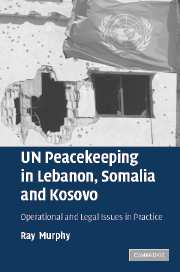Book contents
- Frontmatter
- Contents
- Preface and acknowledgments
- Maps
- 1 Introduction
- 2 The political and diplomatic background to the establishment of peace support operations in Lebanon, Somalia and Kosovo
- 3 Legal framework of UN peacekeeping forces and issues of command and control
- 4 United Nations peacekeeping in Lebanon, Somalia and Kosovo, and the use of force
- 5 UN military operations and international humanitarian and human rights law
- 6 Conclusion
- Appendix 1 Resolutions of the Security Council: UNIFIL
- Appendix 2 Resolutions of the Security Council: Somalia
- Appendix 3 Resolutions of the Security Council: Kosovo
- Bibliography
- Index
3 - Legal framework of UN peacekeeping forces and issues of command and control
Published online by Cambridge University Press: 22 July 2009
- Frontmatter
- Contents
- Preface and acknowledgments
- Maps
- 1 Introduction
- 2 The political and diplomatic background to the establishment of peace support operations in Lebanon, Somalia and Kosovo
- 3 Legal framework of UN peacekeeping forces and issues of command and control
- 4 United Nations peacekeeping in Lebanon, Somalia and Kosovo, and the use of force
- 5 UN military operations and international humanitarian and human rights law
- 6 Conclusion
- Appendix 1 Resolutions of the Security Council: UNIFIL
- Appendix 2 Resolutions of the Security Council: Somalia
- Appendix 3 Resolutions of the Security Council: Kosovo
- Bibliography
- Index
Summary
Introduction
The question of command and control of UN and other multi-national operations is one of the more serious issues confronting the formation of international forces. Command of UN forces is fraught with difficulties arising from both subjective human factors and objective legal constraints. This chapter examines these and related issues with particular reference to the Lebanon (UNIFIL), Somalia (UNOSOM II) and Kosovo (UNMIK/KFOR) operations. The problems encountered at an international level often have their origins in municipal law and the national policy of contributing states. For example, under Canadian law, at no stage in any international operation is national command of Canadian Forces to be handed over to a foreign commander. Yet it is axiomatic that unity of command is a necessary component for the success of any military force, including international UN forces. The submission of national contingents serving in UN forces to foreign command is unavoidable in multi-national UN forces. In theory, the command structure of such forces is straightforward, but in practice this is seldom the case. A mechanism to overcome the difficulties created has been described as follows:
The multi-national character [of UN forces] introduces difficulties that otherwise might not be encountered. Command is normally a national matter, and some countries, in recognition of this basic fact, have specific prohibitions precluding their military forces from taking orders from nationals of another country. Fortunately … a modus vivendi [can] be found during actual operations … by using [national] … officers on the Force Commander's staff […]
- Type
- Chapter
- Information
- UN Peacekeeping in Lebanon, Somalia and KosovoOperational and Legal Issues in Practice, pp. 106 - 147Publisher: Cambridge University PressPrint publication year: 2007



